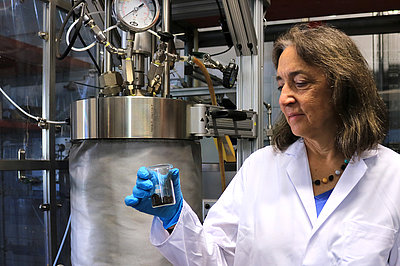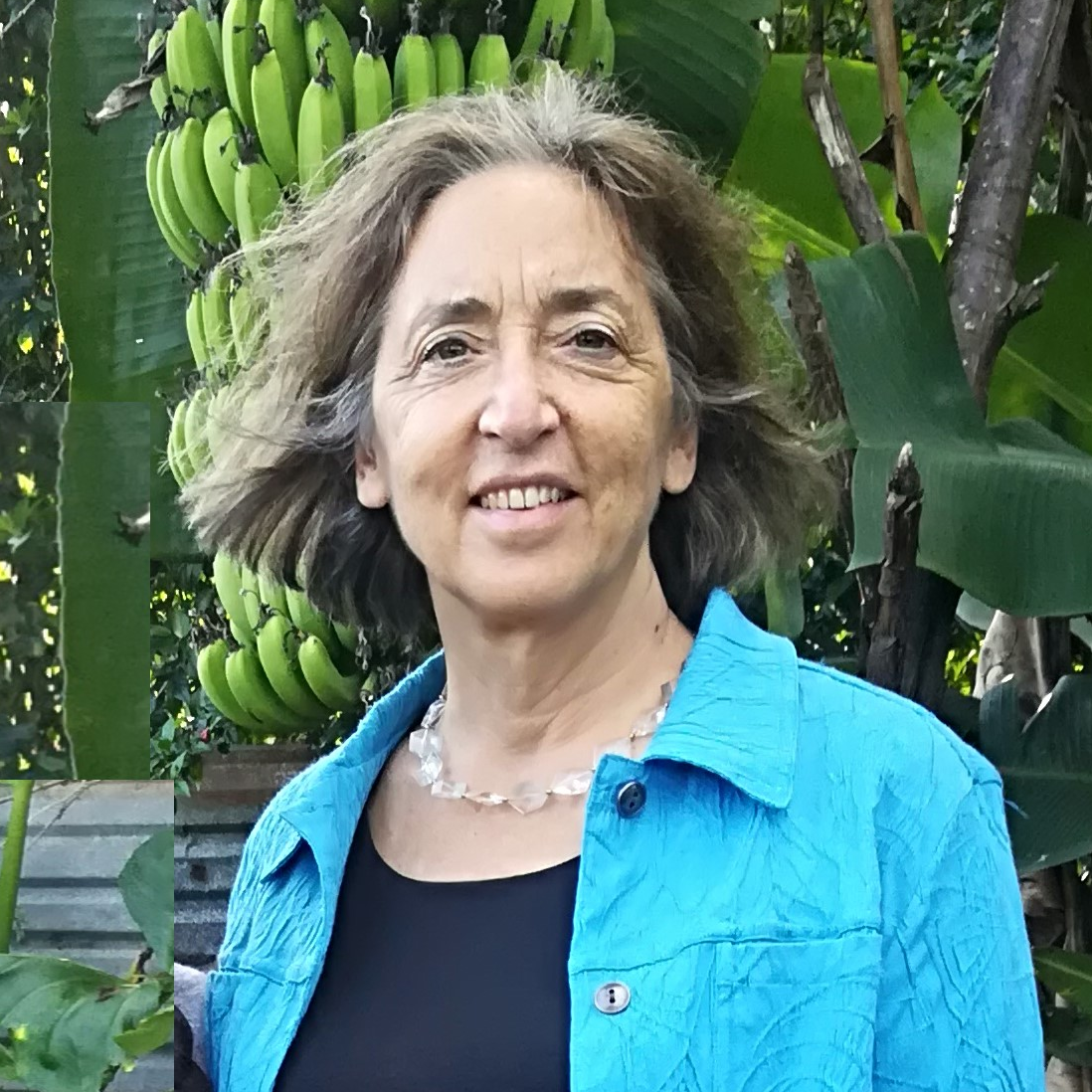Biochar
Energy source, peat substitute and soil additive - an all-rounder with climate protection potential
In view of the urgent global challenges, it is necessary to break new ground for agriculture and horticulture in order to ensure a sustainable and at the same time long-term preservation of soil humus content and its fertility and thus to contribute to climate protection.
Carbonisation as a contribution to climate protection
A promising approach to carbon sequestration is the thermal stabilisation of carbon compounds resulting from incomplete combustion of biomass. Thermochemical treatment (pyrolysis and hydrothermal carbonisation) can be used to carbonise both woody and unwoody biomass to form biochar, thus protecting it from rapid microbial degradation.
Biochar - additives for the soil
In connection with the recycling of agricultural waste streams, ATB is researching on strategies for the production of agents for the soil with a positive effect on the soil water balance in order to mitigate the effects of droughts, contribute to the sequestration of CO2 and sequester carbon in the soil.
Terra preta is a good example in this respect. This fertile black soil, which has been formed in the Amazon basin over centuries, is characterised by the fact that it stores large quantities of nutrients and organic carbon.
Biochar as substitute for peat
Agriculture and horticulture contribute significantly to increasing the climate-damaging content of carbon dioxide (CO2) in our atmosphere. Carbon-rich peat deposits in wetlands play a key role in this context. Their extraction and horticultural use leads to the unavoidable release of CO2.
Alternative materials such as composts, wood fibres or biochar could replace peat in substrates for cultivated plants in the future. Biochars offer great potential for this, partly because they have similar low pH and conductivity values as peat. Peat substitutes should feature the lowest possible nutrient and lime content, low N immobilisation, loose storage and high structural stability, as well as a high air capacity and sufficient water storage capacity.
With our research work in ATB's biochar lab we are currently investigating to what extent chars from pyrolysis and hydrothermal carbonisation (HTC) can be used as alternative substrates to supplement or even replace the peat used in growing media.
In the case of HTC carbons, furfurals and phenols, which may be generated depending on the process conditions, must be removed. In order to meet the quality criteria for peat replacement in growing media, we develop further post-treatments of the chars and evaluate their effectiveness by means of germination tests.
Selected research projects on this topic
-
Vietnams national strategy for improving the competitiveness of coffee exports aims to improve the product quality of coffee. One proposed measure is to change the processing method of coffee cherries. Instead of the tra…
-
The main aim of the GO-GRASS project is to create new business opportunities in rural areas based on grassland and green fodder that will be demonstrated in four EU regions at small scale, ensuring its replicability all …
-
In the EIP project Digestate products for the improvement of animal housing and the soil structure, biochar is produced by pyrolysis of fermentation residues from biogas plants, which then is to be used in dairy barns as…
-
Despite the global effort for providing proper sanitation service to the habitants in less developed regions, still massive amount of faecal waste is disposed of in-situ resulting in serious health problems and environme…
Search for more projects ...
Selected publications on this topic
- Heinrich, T.; Park, H.; Orozco, R.; Ding, Z.; Álvarez-López, V.; Mosquera-Losada, M.; Steinbeis, L.; Hoffmann, T. (2023): Biochar production from late-harvest grass - Challenges and potential for farm-scale implementation. Sustainable Production and Consumption. (May): p. 256-267. Online: https://doi.org/10.1016/j.spc.2023.02.019
- Marzban, N.; Libra, J.; Rotter, V.; Ro, K.; Moloeznik Paniagua, D.; Filonenko, S. (2023): Changes in Selected Organic and Inorganic Compounds in the Hydrothermal Carbonization Process Liquid While in Storage. ACS Omega. (4): p. 4234-4243. Online: https://doi.org/10.1021/acsomega.2c07419
- Ro, K.; Libra, J.; Alvarez-Murillo, A. (2020): Comparative Studies on Water- and Vapor-Based Hydrothermal Carbonization: Process Analysis. Energies. (21): p. 5733. Online: https://doi.org/10.3390/en13215733
- Chung, J.; Gerner, G.; Ovsyannikova, E.; Treichler, A.; Baier, U.; Libra, J.; Krebs, R. (2021): Hydrothermal carbonization as an alternative sanitation technology: process optimization and development of low-cost reactor [version 1; peer review: 2 approved with reservations]. Open Research Europe. (139): p. 0. Online: https://doi.org/10.12688/openreseurope.14306.1
- Kern, J.; Giani, L.; Teixeira, W.; Lanza, G.; Glaser, B. (2019): What can we learn from ancient fertile anthropic soil (Amazonian Dark Earths, shell mounds, Plaggen soil) for soil carbon sequestration?. Catena. (Jan): p. 104-112. Online: https://doi.org/10.1016/j.catena.2018.08.008
- Román, S.; Libra, J.; Berge, N.; Sabio, E.; Ro, K.; Li, L.; Ledesma, B.; Álvarez, A.; Bae, S. (2018): Hydrothermal carbonization: Modeling, final properties design and applications: A review. Energies. (1): p. 1-28. Online: http://dx.doi.org/10.3390/en11010216
- Herrmann, C.; Sanchez, E.; Schultze, M.; Borja (2021): Comparative effect of biochar and activated carbon addition on the mesophilic anaerobic digestion of piggery waste in batch mode. Journal of Environmental Science and Health PART A-Toxic/Hazardous Substances & Environmental Engineering. (9): p. 946-952. Online: https://doi.org/10.1080/10934529.2021.1944833
Search for more publications on this topic ...


